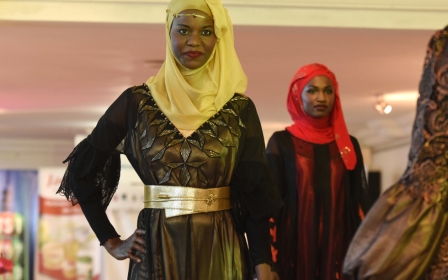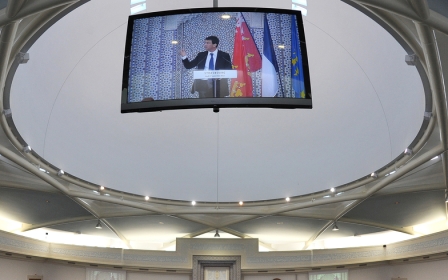When a French school suspends Muslim girl for wearing a long skirt

Last May, the New York Times dedicated an editorial to the use of laïcité (a French term resembling secular law) in France to exclude, humiliate and dominate Muslim citizens.
The story behind the article was a witch hunt initiated against French Muslim students who have been expelled or suspended from school for wearing skirts deemed too long by teachers or principals.
The incidents sparked international outrage and ridicule in some quarters for France, but this did not change Education Minister Najat Vallaud-Belkacem’s stance on the issue – she supported the school authorities.
Rather than an isolated case, these rules appear to highlight an official policy of religious profiling against Muslims that is supported by the minister of education herself.
For instance, about one year ago, the education board in Loiret, a department in north-central France, sent a letter to school principals saying that students’ parents who were “too much religiously dressed” should be reported. The policy was secretly applied until the memo was leaked, leading to pressure on the local school board to withdraw it.
Secular fundamentalism in France has become a major source of social tensions. Using laïcité as a pretext, Muslim students are constantly under fire. Although several dozen cases have been reported to Muslim rights NGO the Collective Against Islamophobia in France (CCIF) - and made world news - nothing seems to discourage what appears nothing less than state-sponsored Islamophobia.
After the headscarf, the skirt
The CCIF this week received another complaint from a parent whose daughter has been denied access to education because of the long skirts she was wearing while at school.
Fannie, not her real name, is a 16-year-old who lives in the western Paris suburbs of Yvelines. She converted to Islam about a year ago, and in accordance with the 2004 law banning her from entering school with her headscarf, removed it every day at the school’s gate.
Despite the humiliation this caused her every single time, Fannie fastidiously complied with the regulation. However, this does not seem to have been enough for her principal, who pushed application of the law further and demanded she wore a shorter skirt.
On 2 May, the principal told the student she would no longer attend school as long as she wore long dresses or skirts. Without warning her parents, she asked Fannie to leave the premises.
The mother tried in vain to speak the principal, but she did not return her calls. Then, on 3 May, the school confirmed that Fannie was excluded from school because her clothes were deemed “too long”.
Fannie’s mother, a Roman Catholic, is well aware of the religious injustice being imposed upon her daughter. She has decided to take every step to protect her daughter’s right to dress as she pleases.
In response, the school principal has expressed her “shock” that the mother would support her daughter’s choice.
The CCIF legal team is currently on the case, which unfortunately is far from being an isolated one. Another high school in the city of Montpellier had applied the same kind of religious discrimination and harassment towards Muslim minors because of their dress code.
After the CCIF intervened in this case, the school principal effectively endangered the life of one by referring her case to the Prefect, under the false accusation that she was preparing to go to Syria.
Rampant religious discrimination in schools
In France, these cases have sparked outrage among those who see this as state-sponsored racism sugar-coated with laïcité. Last spring a campaign was launched under the hashtag #JeProteMaJupeCommeJeVeux (I wear my skirt as I please).
At the time of writing, three new cases have just been sent to the CCIF, one of which saw social services directly entering the school to speak with a student without even warning her parents.
This is happening as students just returned to school from their spring vacations and are only a few weeks away from end-of-year exams. If anyone wanted to disturb them and increase their chances of failing, they couldn’t have chosen a better time.
Laboratory of islamophobia
Islamophobia in France is running wild and seemingly targeting the very presence of Muslims. Recently, French Prime Minister Manuel Valls reiterated the statement that he will fight against the Muslim headscarf and prohibit it further in universities. A couple of weeks ago, the minister for women’s rights had even declared that veiled Muslim women were similar to “American n****** who were in favour of slavery”.
The statement led to a class action of nearly 400 plaintiffs.
France is home to the largest Muslim minority in Europe, yet it is there that their presence is facing the deepest challenge. Despite being in France for generations, these families are still perceived as second-class citizens. Being Muslim in France means being less likely to get a job.
They have also been the first targets of the government’s brutal state of emergency after the Paris November attacks. Despite efforts to integrate as demonstrated by a report by the National Institute for Demographic Studies, titled Trajectories and Origins, the system is failing.
- Yasser Louati is the spokesperson of the Collective Against Islamphobia in France (CCIF) and head of its international relations desk. You can follow him on Twitter @yasserlouati
The views expressed in this article belong to the author and do not necessarily reflect the editorial policy of Middle East Eye.
Photo: Schoolchildren read in a classroom during a visit of French National Education minister on 22 February, 2016 in Le Havre, northwestern France (AFP).
New MEE newsletter: Jerusalem Dispatch
Sign up to get the latest insights and analysis on Israel-Palestine, alongside Turkey Unpacked and other MEE newsletters
Middle East Eye delivers independent and unrivalled coverage and analysis of the Middle East, North Africa and beyond. To learn more about republishing this content and the associated fees, please fill out this form. More about MEE can be found here.





